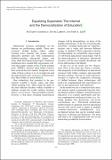Equalizing Superstars: The Internet and the Democratization of Education
Author(s)
Acemoglu, Daron; Laibson, David; List, John A.
DownloadAcemoglu_Equalizing superstars.pdf (472.1Kb)
PUBLISHER_POLICY
Publisher Policy
Article is made available in accordance with the publisher's policy and may be subject to US copyright law. Please refer to the publisher's site for terms of use.
Terms of use
Metadata
Show full item recordAbstract
Internet-based educational resources are proliferating rapidly. One concern associated with these (potentially transformative) technological changes is that they will be disequalizing—as many technologies of the last several decades have been—creating superstar teachers and a winner-take-all education system. These important concerns notwithstanding, we contend that a major impact of web-based educational technologies will be the democratization of education: educational resources will be more equally distributed, and lower-skilled teachers will benefit. At the root of our results is the observation that skilled lecturers can only exploit their comparative advantage if other teachers complement those lectures with face-to-face instruction. This complementarity will increase the quantity and quality of face-to-face teaching services, potentially increasing the marginal product and wages of lower-skill teachers.
Date issued
2014-05Department
Massachusetts Institute of Technology. Department of EconomicsJournal
American Economic Review
Publisher
American Economic Association
Citation
Acemoglu, Daron, David Laibson, and John A. List. “ Equalizing Superstars: The Internet and the Democratization of Education.” American Economic Review 104, no. 5 (May 2014): 523–527.
Version: Final published version
ISSN
0002-8282